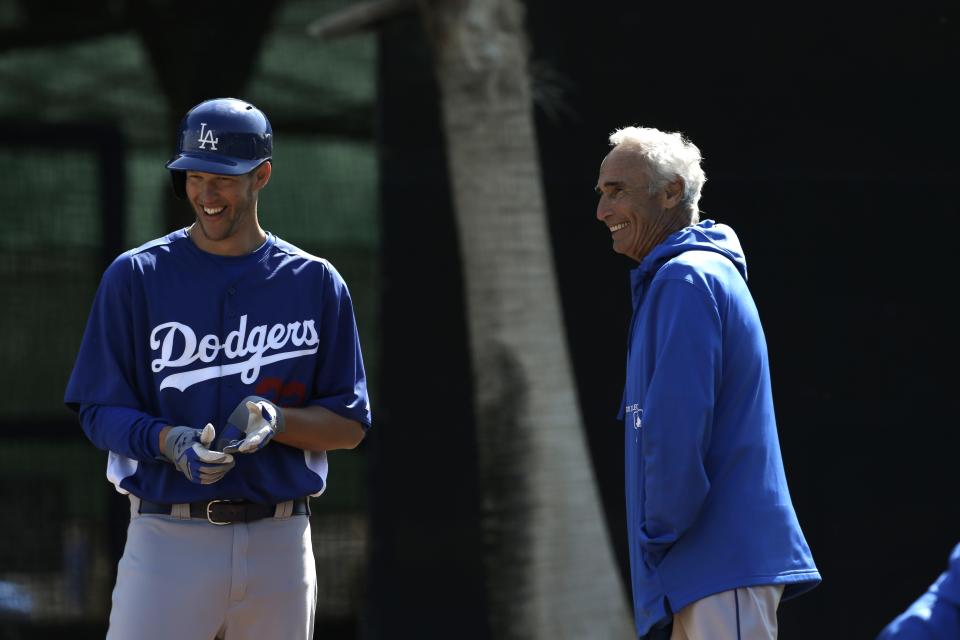As Clayton Kershaw passes Sandy Koufax in wins, October remains the focus
LOS ANGELES — When the Los Angeles Dodgers weren’t very good and when they were great, when he was skinny and floppy and when he was grown and daunting, in regular seasons and in October, in Vero Beach and Glendale, I got in a car to go see Clayton Kershaw.
Because the baseball was good. Because he cared. Because his standard became everyone else’s. Because the chance for greatness over three hours was more likely than it was not. Because he was better than most everyone else many nights.
Because Sandy Koufax existed in another time, in my mind in black and white, in my ears as a tinny and tenor voice-over, in my eyes as the dignified older gentleman leaning on a bullpen rail, whispering into Kershaw’s ear.
So Clayton Kershaw would do, at 20 years old when he was afflicted by the typical left-handed maladies of audacity and imprecision, a decade later when he won his 166th game, one more than Koufax, in between as a destination on countless summer nights against the darkening San Gabriel Mountains.
There wouldn’t be another Koufax, of course. Just as there wouldn’t be another Kershaw. But, at times, they would intersect, a few weeks ago when Kershaw reached and then passed Koufax’s strikeout total, on a Tuesday night in Kershaw’s 12th big-league summer when he pitched to pass Koufax’s win total. And, really, often enough when they lined the field and turned on the lights and, a pitch at a time, set out to decide who could be better. Who could be most stubborn. Who could claim the strike zone as theirs, the thickest part of the bat, the scoreboard, the imagination of a crowd.
Who could win.
“Oh,” the Dodgers manager, Dave Roberts, said, “it’s certainly fair to compare the two. Clayton, over the longevity of his career, has earned to right to be compared to Koufax.”

Across those dozen seasons, the ball was in his hand. When they won, when they lost. When they celebrated, when they mourned, when they started over. Always, it seemed, Kershaw. Always, I imagined, as with Koufax.
The demon Kershaw fights and lives with is October, which cannot be whipped in August. The fastball that slows cannot ascend again merely because he wishes it to. The baseball will not die on the warning track because the men who make it say it should.
And so Clayton Kershaw pitches toward his ninth October with a fastball that strains to get out of the 80s and the jumpiest ball of his (or, perhaps, anyone’s) career. If the fastball velocity says he is in decline, and some of the peripheral numbers second that impression, and as his fastball and slider began to merge, and if it is fair to suggest that at 31 he might never be precisely the pitcher he was before 2,000 innings came, then 2,100, then 2,200, then 2,300, then it must also be said he has declined to a 2.71 ERA and 13 wins and two losses and a top-10 pitcher WAR in the National League.
What seems to separate Kershaw from plenty of others is his will to show up, not every fifth day, but every day. When October ends he returns in February to the same plan for that morning, whatever that day is, to roll the rock an inch up the hill, to start again over a worn path.
In seven starts before Tuesday night’s against the Toronto Blue Jays, and make what you will of the Miami Marlins twice and the San Diego Padres twice among those seven, Kershaw posted a 1.40 ERA and .167 batting average against across 45 innings. He struck out 59, walked 13 and allowed two home runs. His fastball had eased a bit away from his slider, and his slider had found some of its former shape and bite, and fly balls stopped landing in the bleachers.
Kershaw allowed three home runs Tuesday night, two of them to rookie Bo Bichette, one on a fastball in the middle of the plate, the other on a slider in the same general area. Derek Fisher hit the other. Kershaw walked three. He was not at his best. Yet, he pitched six innings. In 22 starts, he has not pitched fewer than six. Because that’s the job. Do that often enough over a dozen seasons, over 338 starts, cover all the ground in between those starts, miss zero reps and, in one way at least, you’d arrive at Koufax.
“It’s special, for sure,” Kershaw said late Tuesday night. “What Sandy means to the organization, what Sandy means to me personally, is an incredible thing. … It’s an honor for me.”

There are other men out there, from eras in which pitchers were measured largely by the score when they walked off the field and then whether they got a handshake or a pat on the butt. Don Sutton won 233 games as a Dodger and Don Drysdale 209, for two. Kershaw is a lot of days from them, in one way at least. While the statistical authority of the pitcher’s win has faded, what resonates still is the reason any of them -- be it Koufax or Kershaw or Drysdale or the newest Dodger among them -- show up, and that is to win. It’s not a three-hour thing. It’s a habit thing. A lifestyle thing. An obsession thing.
“I don’t know what that means,” Kershaw said of his 166th win, the one that passed the iconic and mystical Koufax, the one that came in spite of himself and because of himself, “to fully appreciate something.
“It’s a humbling game, so I’m back to the drawing board, working on things to get better for the next one.”
He said he’d not heard from Koufax himself and seemed to chuckle at the thought of it. He said the baseball in his locker, the one resting against a jar of something, was not the game ball. “Want it?” he asked as if to settle its worthlessness. He said these were notions he’d consider some other day, maybe when he’s done. And he’s not done. He turned to leave, then added, “It’s hard for me to take a big-picture perspective of things. Somewhere in my brain I can’t do that and continue to be successful every single day. You’d think you’re better than you are.”
More from Yahoo Sports:


